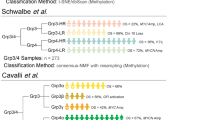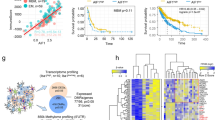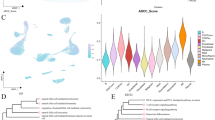Abstract
Background
Acute myeloid leukemia (AML) is a common leukemia with low cure rate and poor prognosis among pediatric patients. The regulation of AML immune microenvironment and methylation remains to be explored. Pediatric and adult AML patients differ significantly in epigenetic factors, and the efficiency of treatment modalities varies between the two groups of patients.
Methods
We collected mRNA, miRNA and DNA methylation data from pediatric AML patients across multiple databases. Differentially expression genes were identified, and a gene–miRNA regulatory network was constructed. Prognostic risk models were established by integrating LASSO and Cox regression, and a nomogram was generated. Based on this model, we investigated tumor-infiltrating immune cells and cell communication, analyzing the biological functions and pathways associated with prognostic factors. Furthermore, the relationships between all prognostic factors and gene modules were explored, and the impact of these factors on treatment modalities was determined.
Results
We developed an efficient prognostic risk model and identified HOXA9, SORT1, SH3BP5, mir-224 and mir-335 as biomarkers. We validated these findings in an external dataset and observed a correlation between age and risk in pediatric patients. AML samples with lower risk scores have a better prognosis and higher expression of immune-upregulated biomarkers, and have lower immune scores. Furthermore, we detected discrepancies in immune cell infiltration and interactions between high- and low-risk group samples, which affected the efficacy of immunotherapy. We evaluated all prognostic factors and predicted the effect of immunotherapy and medicine.
Conclusion
This study comprehensively investigated the role of methylation signature genes in pediatric AML at the level of genomes and transcriptomes. The research aims to enhance the risk stratification, prognosis evaluation and assessment of treatment effectiveness of AML patients. This study also highlight the uniqueness of pediatric AML and foster the development of new immunotherapy and targeted therapy strategies.








Similar content being viewed by others
Availability of data and materials
The datasets supporting the conclusions of this article are available in the TARGET (https://www.cancer.gov/ccg/access-data), Targetscan (https://www.targetscan.org/vert_80/), miRcode (http://mircode.org/), GEO (https://www.ncbi.nlm.nih.gov/geo/query/acc.cgi?acc=GSM5936941) and TCGA (https://portal.gdc.cancer.gov/).
Abbreviations
- AML:
-
Acute myeloid leukemia
- ssGSEA:
-
Single sample gene set enrichment analysis
- GSEA:
-
Gene set enrichment analysis
- WGCNA:
-
Weighted correlation network analysis
- TCGA:
-
The cancer genome atlas
- miRNAs:
-
MicroRNAs
- DEGs:
-
Discovering differentially expressed genes
- scRNA-seq:
-
Single-cell RNA-seq
- LASSO:
-
Least absolute shrinkage and selection operator
- ROC:
-
Receiver operating characteristic
- AUC:
-
Areas under the curve
- K–M:
-
Kaplan–Meier
- TME:
-
Tumor microenvironment
- KEGG:
-
Kyoto encyclopedia of genes and genomes
- GO:
-
Gene ontology
- OS:
-
Overall survival
- CR:
-
Complete response
- CAR-T:
-
Chimeric antigen receptor T-cells
References
Abbas HA, Hao D, Tomczak K, Barrodia P, Im JS, Reville PK et al (2021) Single cell T cell landscape and T cell receptor repertoire profiling of Aml in context of Pd-1 blockade therapy. Nat Commun 12(1):6071. https://doi.org/10.1038/s41467-021-26282-z
Aryal S, Zhang Y, Wren S, Li C, Lu R (2023) Molecular regulators of Hoxa9 in acute myeloid leukemia. FEBS J 290(2):321–339. https://doi.org/10.1111/febs.16268
Ashcroft BA, de Sonneville J, Yuana Y, Osanto S, Bertina R, Kuil ME et al (2012) Determination of the size distribution of blood microparticles directly in plasma using atomic force microscopy and microfluidics. Biomed Microdevice 14(4):641–649. https://doi.org/10.1007/s10544-012-9642-y
Bertoli G, Cava C, Castiglioni I (2015) Micrornas: new biomarkers for diagnosis, prognosis, therapy prediction and therapeutic tools for breast cancer. Theranostics 5(10):1122–1143. https://doi.org/10.7150/thno.11543
Bolouri H, Farrar JE, Triche T, Ries RE, Lim EL, Alonzo TA et al (2018) The molecular landscape of pediatric acute myeloid leukemia reveals recurrent structural alterations and age-specific mutational interactions. Nat Med 24(1):103–112. https://doi.org/10.1038/nm.4439
Burnett A, Wetzler M, Löwenberg B (2011) Therapeutic advances in acute myeloid leukemia. J Clin Oncol off J Am Soc Clin Oncol 29(5):487–494. https://doi.org/10.1200/JCO.2010.30.1820
Cancer Genome Atlas Research N, Ley TJ, Miller C, Ding L, Raphael BJ, Mungall AJ et al (2013) Genomic and epigenomic landscapes of adult de novo acute myeloid leukemia. N Engl J Med 368(22):2059–2074. https://doi.org/10.1056/NEJMoa1301689
Creutzig U, Kutny MA, Barr R, Schlenk RF, Ribeiro RC (2018) Acute myelogenous leukemia in adolescents and young adults. Pediatric Blood Cancer 65(9):e27089. https://doi.org/10.1002/pbc.27089
Del Gaudio N, Di Costanzo A, Liu NQ, Conte L, Dell’Aversana C, Bove G et al (2022) Cbx2 shapes chromatin accessibility promoting Aml Via P38 Mapk signaling pathway. Mol Cancer 21(1):125. https://doi.org/10.1186/s12943-022-01603-y
Elgarten CW, Aplenc R (2020) Pediatric acute myeloid leukemia: updates on biology, risk stratification, and therapy. Curr Opin Pediatr 32(1):57–66. https://doi.org/10.1097/MOP.0000000000000855
Friedman J, Hastie T, Tibshirani R (2010) Regularization paths for generalized linear models via coordinate descent. J Stat Softw 33(1):1–22
Gamis AS, Alonzo TA, Meshinchi S, Sung L, Gerbing RB, Raimondi SC et al (2014) Gemtuzumab ozogamicin in children and adolescents with de novo acute myeloid leukemia improves event-free survival by reducing relapse risk: results from the randomized phase III Children’s Oncology Group Trial Aaml0531. J Clin Oncol off J Am Soc Clin Oncol 32(27):3021–3032. https://doi.org/10.1200/JCO.2014.55.3628
Goswami M, Prince G, Biancotto A, Moir S, Kardava L, Santich BH et al (2017) Impaired B cell immunity in acute myeloid leukemia patients after chemotherapy. J Transl Med 15(1):155. https://doi.org/10.1186/s12967-017-1252-2
Hajibabaei S, Sotoodehnejadnematalahi F, Nafissi N, Zeinali S, Azizi M (2023) Aberrant promoter hypermethylation of Mir-335 and Mir-145 is involved in breast cancer Pd-L1 overexpression. Sci Rep 13(1):1003. https://doi.org/10.1038/s41598-023-27415-8
Hanzelmann S, Castelo R, Guinney J (2013) Gsva: gene set variation analysis for microarray and Rna-Seq data. BMC Bioinform 14:7. https://doi.org/10.1186/1471-2105-14-7
Huang BJ, Smith JL, Farrar JE, Wang YC, Umeda M, Ries RE et al (2022) Integrated stem cell signature and cytomolecular risk determination in pediatric acute myeloid leukemia. Nat Commun 13(1):5487. https://doi.org/10.1038/s41467-022-33244-6
Jia M, Zhang H, Wang L, Zhao L, Fan S, Xi Y (2021) Identification of mast cells as a candidate significant target of immunotherapy for acute myeloid leukemia. Hematology (amsterdam, Netherlands) 26(1):284–294. https://doi.org/10.1080/16078454.2021.1889158
Jones LM, Tarlock K, Cooper T (2021) Targeted therapy in pediatric Aml: an evolving landscape. Paediatr Drugs 23(5):485–497. https://doi.org/10.1007/s40272-021-00467-x
Kamarudin AN, Cox T, Kolamunnage-Dona R (2017) Time-dependent roc curve analysis in medical research: current methods and applications. BMC Med Res Methodol 17(1):53. https://doi.org/10.1186/s12874-017-0332-6
Kantarjian HM, Keating MJ, Freireich EJ (2018) Toward the potential cure of leukemias in the next decade. Cancer 124(22):4301–4313. https://doi.org/10.1002/cncr.31669
Lambert J, Pautas C, Terré C, Raffoux E, Turlure P, Caillot D et al (2019) Gemtuzumab ozogamicin for de novo acute myeloid leukemia: final efficacy and safety updates from the open-label, phase Iii Alfa-0701 trial. Haematologica 104(1):113–119. https://doi.org/10.3324/haematol.2018.188888
Langfelder P, Horvath S (2008) Wgcna: an R package for weighted correlation network analysis. BMC Bioinform 9:559. https://doi.org/10.1186/1471-2105-9-559
Li M, Hao S, Li C, Xiao H, Sun L, Yu Z et al (2019) Elevated Sh3bp5 correlates with poor outcome and contributes to the growth of acute myeloid leukemia cells. Biomolecules 9(9):505. https://doi.org/10.3390/biom9090505
Liu H (2021) Emerging agents and regimens for Aml. J Hematol Oncol 14(1):49. https://doi.org/10.1186/s13045-021-01062-w
Liu Z, Elcheva I (2022) A six-gene prognostic signature for both adult and pediatric acute myeloid leukemia identified with machine learning. Am J Transl Res 14(9):6210–6221
Lonetti A, Pession A, Masetti R (2019) Targeted therapies for pediatric Aml: gaps and perspective. Front Pediatr 7:463. https://doi.org/10.3389/fped.2019.00463
Marcucci G, Mrózek K, Radmacher MD, Garzon R, Bloomfield CD (2011) The prognostic and functional role of micrornas in acute myeloid leukemia. Blood 117(4):1121–1129. https://doi.org/10.1182/blood-2010-09-191312
McGeary SE, Lin KS, Shi CY, Pham TM, Bisaria N, Kelley GM et al (2019) The biochemical basis of microrna targeting efficacy. Science. https://doi.org/10.1126/science.aav1741
McNulty M, Crispino JD (2020) Acute megakaryocytic leukemia. Cold Spring Harbor Perspect Med 10(2):a034884. https://doi.org/10.1101/cshperspect.a034884
Modarres P, Mohamadi Farsani F, Nekouie AA, Vallian S (2021) Meta-analysis of gene signatures and key pathways indicates suppression of Jnk pathway as a regulator of chemo-resistance in Aml. Sci Rep 11(1):12485. https://doi.org/10.1038/s41598-021-91864-2
Nakamura T, Largaespada DA, Lee MP, Johnson LA, Ohyashiki K, Toyama K et al (1996) Fusion of the nucleoporin gene Nup98 to Hoxa9 by the chromosome translocation T(7;11)(P15;P15) in human myeloid leukaemia. Nat Genet 12(2):154–158. https://doi.org/10.1038/ng0296-154
Nakayama T, Hirahara K, Onodera A, Endo Y, Hosokawa H, Shinoda K et al (2017) Th2 cells in health and disease. Annu Rev Immunol 35:53–84. https://doi.org/10.1146/annurev-immunol-051116-052350
Ni Z, Xing D, Zhang T, Ding N, Xiang D, Zhao Z et al (2021) Tumor-infiltrating B cell is associated with the control of progression of gastric cancer. Immunol Res 69(1):43–52. https://doi.org/10.1007/s12026-020-09167-z
Piccin A, Murphy WG, Smith OP (2007) Circulating microparticles: pathophysiology and clinical implications. Blood Rev 21(3):157–171. https://doi.org/10.1016/j.blre.2006.09.001
Pommert L, Tarlock K (2022) The evolution of targeted therapy in pediatric Aml: gemtuzumab ozogamicin, Flt3/Idh/Bcl2 inhibitors, and other therapies. Hematol Am Soc Hematol Educ Program 2022(1):603–610. https://doi.org/10.1182/hematology.2022000358
Pommert L, Schafer ES, Malvar J, Gossai N, Florendo E, Pulakanti K et al (2022) Decitabine and vorinostat with flag chemotherapy in pediatric relapsed/refractory Aml: report from the therapeutic advances in childhood leukemia and lymphoma (Tacl) Consortium. Am J Hematol 97(5):613–622. https://doi.org/10.1002/ajh.26510
Prager I, Watzl C (2019) Mechanisms of natural killer cell-mediated cellular cytotoxicity. J Leukoc Biol 105(6):1319–1329. https://doi.org/10.1002/JLB.MR0718-269R
Qiao R, Zhong R, Liu C, Di F, Zhang Z, Wang L et al (2022) Novel blood-based hypomethylation of Sh3bp5 is associated with very early-stage lung adenocarcinoma. Genes Genom 44(4):445–453. https://doi.org/10.1007/s13258-021-01190-0
Quessada J, Cuccuini W, Saultier P, Loosveld M, Harrison CJ, Lafage-Pochitaloff M (2021) Cytogenetics of pediatric acute myeloid leukemia: a review of the current knowledge. Genes 12(6):924. https://doi.org/10.3390/genes12060924
Ren X, Zhang L, Zhang Y, Li Z, Siemers N, Zhang Z (2021) Insights gained from single-cell analysis of immune cells in the tumor microenvironment. Annu Rev Immunol 39:583–609. https://doi.org/10.1146/annurev-immunol-110519-071134
Ritchie ME, Phipson B, Wu D, Hu Y, Law CW, Shi W et al (2015) Limma powers differential expression analyses for Rna-sequencing and microarray studies. Nucleic Acids Res 43(7):e47. https://doi.org/10.1093/nar/gkv007
Rubnitz JE, Kaspers GJL (2021) How I treat pediatric acute myeloid leukemia. Blood 138(12):1009–1018. https://doi.org/10.1182/blood.2021011694
Serroukh Y, Hébert J, Busque L, Mercier F, Rudd CE, Assouline S et al (2023) Blasts in context: the impact of the immune environment on acute myeloid leukemia prognosis and treatment. Blood Rev 57:100991. https://doi.org/10.1016/j.blre.2022.100991
Short NJ, Konopleva M, Kadia TM, Borthakur G, Ravandi F, DiNardo CD et al (2020) Advances in the treatment of acute myeloid leukemia: new drugs and new challenges. Cancer Discov 10(4):506–525. https://doi.org/10.1158/2159-8290.CD-19-1011
Siegel RL, Miller KD, Fuchs HE, Jemal A (2022) Cancer statistics, 2022. CA Cancer J Clin 72(1):7–33. https://doi.org/10.3322/caac.21708
Symeonidou V, Ottersbach K (2021) Hoxa9/Irx1 expression pattern defines two subgroups of infant Mll-Af4-driven acute lymphoblastic leukemia. Exp Hematol 93:38-43.e5. https://doi.org/10.1016/j.exphem.2020.10.002
Taga T, Tomizawa D, Takahashi H, Adachi S (2016) Acute myeloid leukemia in children: current status and future directions. Pediatr Int off J Jpn Pediatr Soc 58(2):71–80. https://doi.org/10.1111/ped.12865
Tarlock K, Sulis ML, Chewning JH, Pollard JA, Cooper T, Gamis A et al (2022) Hematopoietic cell transplantation in the treatment of pediatric acute myelogenous leukemia and myelodysplastic syndromes: guidelines from the American Society of Transplantation and Cellular Therapy. Transplant Cell Ther 28(9):530–545. https://doi.org/10.1016/j.jtct.2022.06.005
Therneau TM (2023) A package for survival analysis in R. https://CRAN.R-project.org/package=survival. Accessed 8 Mar 2023
Wickham H (2016) Ggplot2: elegant graphics for data analysis. Springer, New York
Wu T, Hu E, Xu S, Chen M, Guo P, Dai Z et al (2021) Clusterprofiler 4.0: a universal enrichment tool for interpreting omics data. Innovation (camb) 2(3):100141. https://doi.org/10.1016/j.xinn.2021.100141
Xu H, Wen Y, Jin R, Chen H (2022) Epigenetic modifications and targeted therapy in pediatric acute myeloid leukemia. Front Pediatr 10:975819. https://doi.org/10.3389/fped.2022.975819
Yamato G, Kawai T, Shiba N, Ikeda J, Hara Y, Ohki K et al (2022) Genome-wide DNA methylation analysis in pediatric acute myeloid leukemia. Blood Adv 6(11):3207–3219. https://doi.org/10.1182/bloodadvances.2021005381
Yang J-H, Lin L-K, Zhang S (2020) Epigenetic silencing of microrna-335 contributes to nasopharyngeal carcinoma metastasis. Am J Otolaryngol 41(1):102302. https://doi.org/10.1016/j.amjoto.2019.102302
Yoshihara K, Shahmoradgoli M, Martinez E, Vegesna R, Kim H, Torres-Garcia W et al (2013) Inferring tumour purity and stromal and immune cell admixture from expression data. Nat Commun 4:2612. https://doi.org/10.1038/ncomms3612
Zarnegar-Lumley S, Caldwell KJ, Rubnitz JE (2022) Relapsed acute myeloid leukemia in children and adolescents: current treatment options and future strategies. Leukemia 36(8):1951–1960. https://doi.org/10.1038/s41375-022-01619-9
Zhang Y, Liu T, Hu X, Wang M, Wang J, Zou B et al (2021) Cellcall: integrating paired ligand-receptor and transcription factor activities for cell-cell communication. Nucleic Acids Res 49(15):8520–8534. https://doi.org/10.1093/nar/gkab638
Zhang Q, Riley-Gillis B, Han L, Jia Y, Lodi A, Zhang H et al (2022) Activation of Ras/Mapk pathway confers Mcl-1 mediated acquired resistance to Bcl-2 inhibitor venetoclax in acute myeloid leukemia. Signal Transduct Target Ther 7(1):51. https://doi.org/10.1038/s41392-021-00870-3
Funding
This study was supported by the Fundamental Research Funds for the Central Universities (DUT22YG131).
Author information
Authors and Affiliations
Contributions
HZ, YX, JX and XG have contributed equally to this work: they designed the study, collected research data, analyzed data and drafted the manuscript; YF, JF, FL and JW were responsible for the interpretation of the results; and GZ and YL provided the overall guidance. All authors read and approved the final manuscript.
Corresponding authors
Ethics declarations
Conflict of interest
The authors declare that they have no competing interests.
Ethics approval and consent to participate
Not applicable.
Consent for publication
Not applicable.
Additional information
Publisher's Note
Springer Nature remains neutral with regard to jurisdictional claims in published maps and institutional affiliations.
Supplementary Information
Below is the link to the electronic supplementary material.
Rights and permissions
Springer Nature or its licensor (e.g. a society or other partner) holds exclusive rights to this article under a publishing agreement with the author(s) or other rightsholder(s); author self-archiving of the accepted manuscript version of this article is solely governed by the terms of such publishing agreement and applicable law.
About this article
Cite this article
Zhu, H., Xu, Y., Xia, J. et al. Identification and analysis of methylation signature genes and association with immune infiltration in pediatric acute myeloid leukemia. J Cancer Res Clin Oncol 149, 14965–14982 (2023). https://doi.org/10.1007/s00432-023-05284-y
Received:
Accepted:
Published:
Issue Date:
DOI: https://doi.org/10.1007/s00432-023-05284-y




